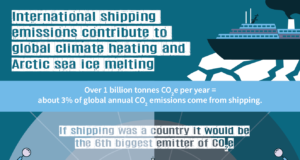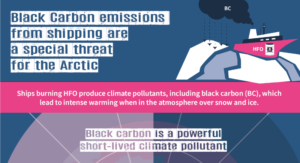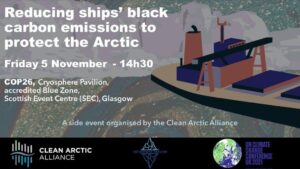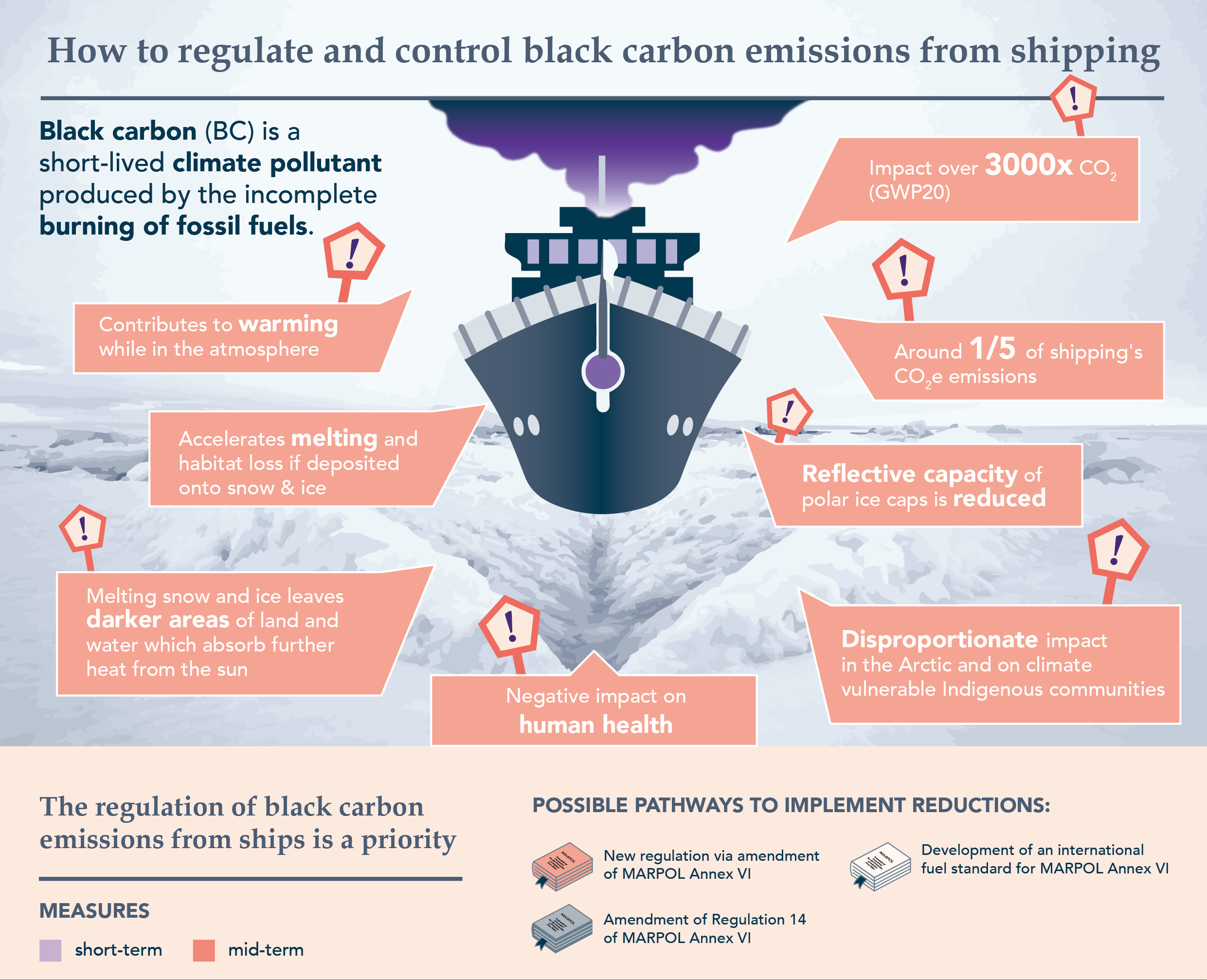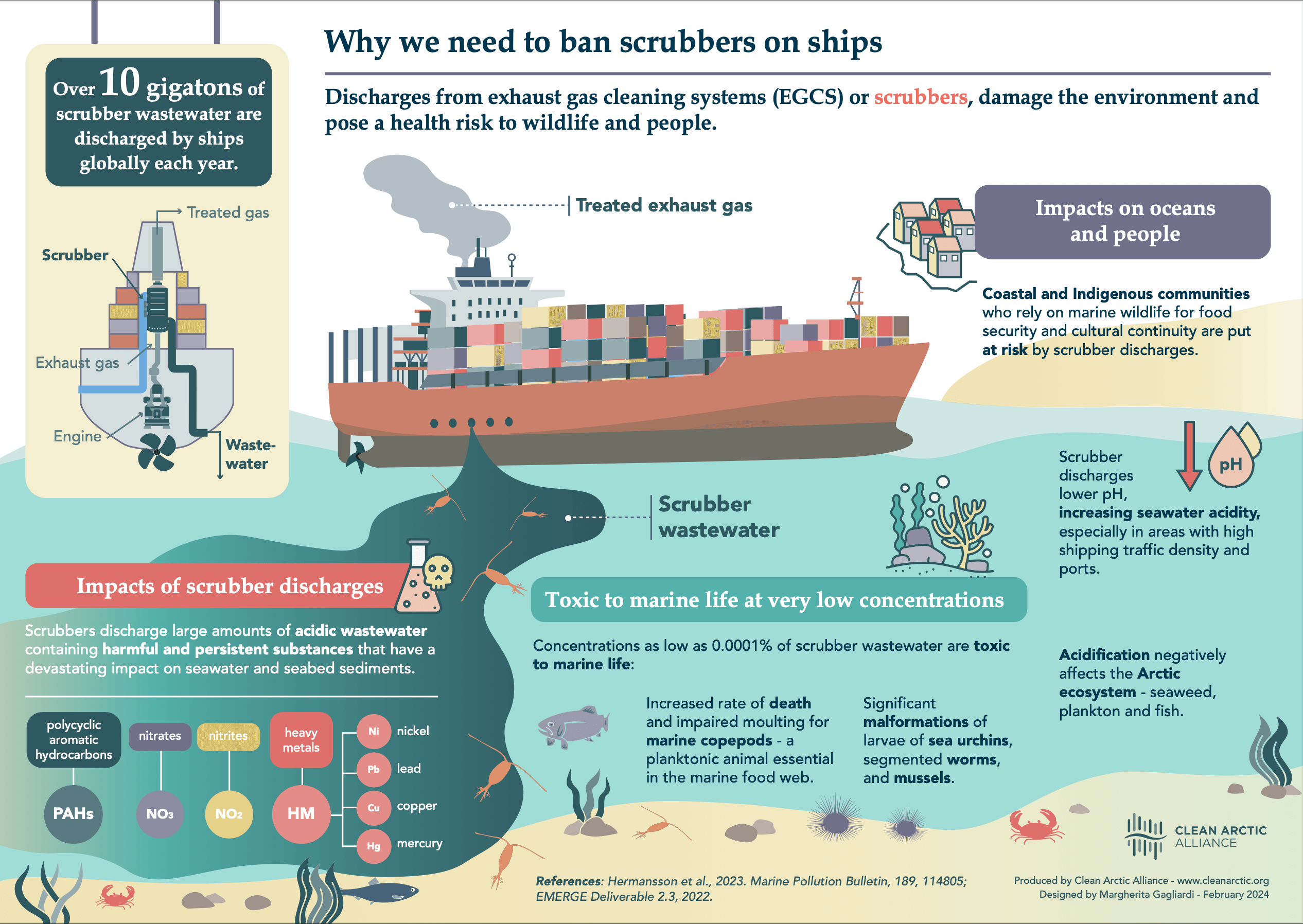- Arctic event during COP26 – see below
- Members of the Clean Arctic Alliance are at COP26 – contact [email protected]
Glasgow, 1 November 2021: As world leaders gather for the COP26 UN climate summit in Glasgow, the Clean Arctic Alliance is calling for them to take action to preserve the crucial climate regulation ability of Arctic sea ice, by fulfilling the Paris Climate Agreement’s commitment to limit global heating to less than 1.5C.
“World Leaders have two weeks to agree on action that will honour the Paris Climate Agreement and arrest the Arctic meltdown”, said Sian Dr Prior, Lead Advisor to the Clean Arctic Alliance. “Any outcome that heats the planet beyond 1.5C is to risk summers with days completely free of sea ice as soon as the early 2030s, which would be disastrous for the global climate.”
The Clean Arctic Alliance also called on the International Maritime Organization (IMO) – the UN body tasked with regulating shipping to adopt reduction measures to set the maritime sector’s emissions on a pathway compatible with the Paris Agreement’s goal of keeping warming below 1.5C, and to achieve full decarbonisation of the shipping sector by 2035.
“In line with decisions that must be made atCOP26 to honour the Paris Agreement, the IMO, during its Marine Environment Protection Committee (MEPC 77) meeting later this month, must urgently put in place strong measures to drive fast deep cuts black carbon emissions from shipping operating in or near the Arctic, and to urgently reduce CO2 as well as black carbon emissions from the maritime sector globally”, said Prior.
“A proposal for a resolution calling on ships operating in and near the Arctic to move from heavier, more polluting fuel oils to lighter distillate fuels has been submitted to MEPC 77 by eleven IMO Member States”, she added [1]. “If all shipping currently using heavy fuel oils while in the Arctic were to switch to distillate fuel, there would be an immediate reduction of around 44% in black carbon emissions from these ships.”
The Alliance also called for inclusion of a 1.5 degree-compatible 6-7% annual improvement in carbon intensity in the IMO’s new short-term measure, and for the United Nations international shipping body to revise its climate targets to ensure full decarbonisation of shipping well before 2050. See infographic: International Shipping emissions contribute to global climate heating and Arctic sea ice melting.
“The recent IPCC findings make the levels of climate ambition and timelines currently on the table for shipping at the IMO totally inadequate”, continued Prior. “It is imperative that measures due for adoption at the IMO’s Marine Environment Protection Committee (MEPC 77) be strengthened to ensure they drive fast deep cuts in CO2 and black carbon emissions from ships, especially those visiting the Arctic.
The IPCC climate report, published on 9 August 2021, found that warming of 1.5 degrees and 2 degrees will be exceeded globally during the 21st century unless deep reductions in CO2 and other greenhouse gas emissions occur by 2030. Arctic sea ice, glacier loss, and Greenland ice sheet loss are included amongst the most certain and severe impacts of global heating, while polar ice sheet loss and sea level rise present some of the greatest threats [2]. Earlier this year, Arctic Foreign Ministers announced that the Arctic has already warmed by three degrees [3].
About the Arctic and Black Carbon
Major shifts in climate occur more strongly and proceed faster at high latitudes with the most dramatic changes seen in the sea-ice cover of the Arctic Ocean. The summer sea ice cover is much reduced compared to only a few decades ago, and the remaining ice is about half as thick. Multi-year ice has declined by around 90%. Days with no summer sea ice could come as soon as the early 2030s, if the world fails to fulfil the Paris Climate Agreement’s commitment to limit global heating to less than 1.5C, which could have unprecedented consequences for the global climate and marine environment.
Arctic shipping is increasing as reduced sea ice opens up access to resources, and interest in shorter trans-Arctic shipping routes grows. Despite global efforts, ships’ black carbon emissions are rising – black carbon emissions from shipping in the Arctic increased 85% between 2015 and 2019. When black carbon settles onto snow and ice, melting accelerates, and the loss of reflectivity creates a feedback loop exacerbating global heating. Black Carbon also has health impacts for Arctic communities. Reductions in black carbon emissions from shipping in or near the Arctic can be introduced rapidly by switching to cleaner fuels and have an immediate impact in reducing melting of snow and ice since the black carbon is short-lived and remains in the atmosphere for only days or weeks.
For more information, see the follow infographics:
How Black Carbon Emissions from Shipping Impact The Arctic
Infographic: Urgent and immediate action needed to cut black carbon emissions from ships
COP26 Event: Reducing ships’ black carbon emissions to protect the Arctic
Friday 5th November, 14.20 – in the Cryosphere Pavilion (Blue Zone), Scottish Event Centre (SEC), COP26, Glasgow
Speakers will address the Arctic cryosphere crisis, the implications for the people of the Arctic and the planet as a whole, implications for health and the role of shipping in reducing impacts through black carbon reductions.
- Prof. Dirk Notz, University of Hamburg/Max Planck Institute for Meteorology (Virtual): The end of the ice-age?
- Lisa Koperqualuk, Vice President, International Affairs, Inuit Circumpolar Council: Black Carbon, Snow, and Ice – Impacts in the Arctic and the need for Global Partnerships
- Her Excellency, Hon. Titilupe Fanetupouvava’u Tu’ivakano: Coral and Ice: Same World; Same Future!
- Dr Richard Hixson, FRCA FFICM, Consultant in Critical Care and Co-founder NHS Ocean on: Human healthcare and the oceans
- Dr Bryan Comer, Marine Program Lead, International Council on Clean Transportation (Virtual): Black carbon and shipping: Trends and policy options to protect the Arctic and the planet
To attend in person: no registration needed (apart from COP26 UNFCCC accreditation)
To join by livestream: details for livestreaming for the event will be available the day before. Email [email protected] to find out more
Notes:
[1] MEPC 77-9 – Comments on the outcome of PPR 8
[2] AR6 Climate Change 2021: The Physical Science Basis. The Working Group I contribution to the Sixth Assessment – Intergovernmental Panel on Climate Change (IPCC)
https://www.ipcc.ch/report/sixth-assessment-report-working-group-i/
[3] Reykjavik Declaration 2021, On the occasion of the Twelfth Ministerial meeting of the Arctic Council
Contacts:
Dave Walsh, Clean Arctic Alliance Communications Advisor [email protected] +34 691 826 764
About the Clean Arctic Alliance
Made up of 21 not-for-profit organisations, the Clean Arctic Alliance campaigns to persuade governments to take action to protect the Arctic, its wildlife and its people.
Members include: 90 North Unit, The Altai Project, Alaska Wilderness League, Bellona, Clean Air Task Force, Green Transition Denmark, Ecology and Development Foundation ECODES, Environmental Investigation Agency, Friends of the Earth US, Global Choices, Greenpeace, Iceland Nature Conservation Association, International Cryosphere Climate Initiative, Nature And Biodiversity Conservation Union, Ocean Conservancy, Pacific Environment, Seas At Risk, Surfrider Foundation Europe, Stand.Earth, Transport & Environment and WWF.
More more information visit https://www.hfofreearctic.org/
Twitter: https://twitter.com/CleanArctic

